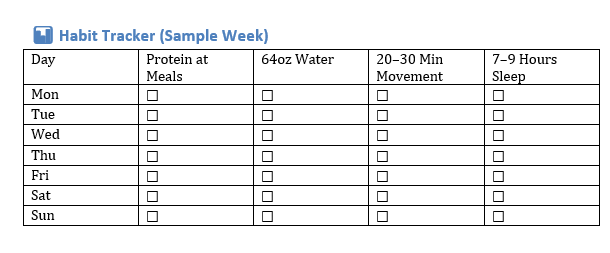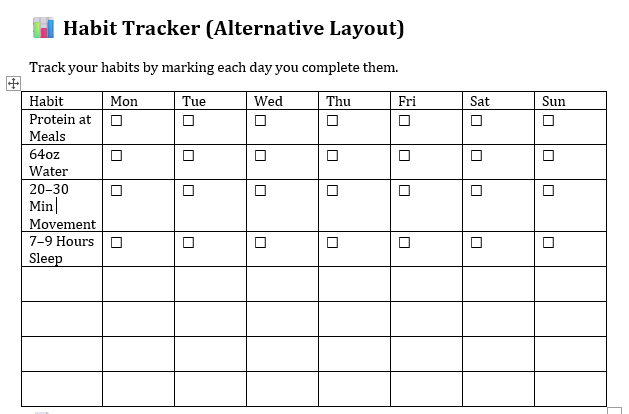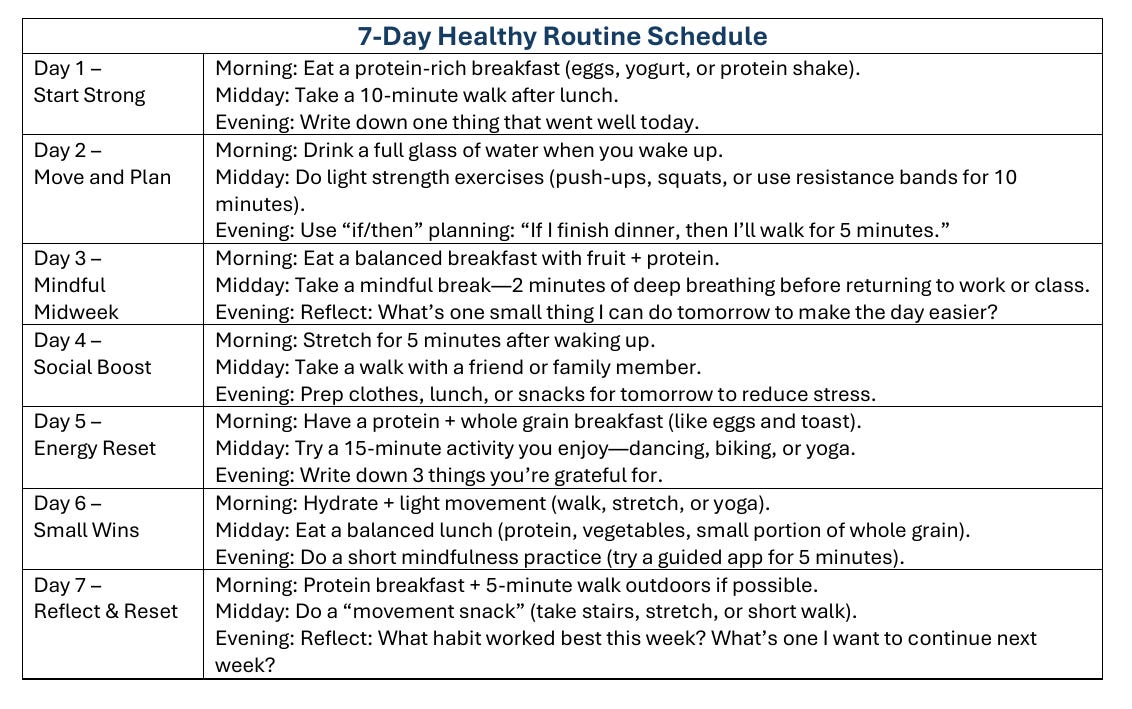September is a season of fresh starts. As summer winds down and routines return, it’s the perfect time to refocus on your health goals. This handout is designed to help you reset after summer indulgences and build healthy habits that stick. Inside, you’ll find practical tips for meal planning, exercise, and daily routines, plus tools like a SMART goals worksheet and habit trackers to keep you consistent. Small steps, done daily, lead to big results—let’s make this your strongest month yet!
✅ Resetting After Summer
· 📅 Plan Your Meals – Take 15 minutes each week to outline 3–4 balanced dinners.
· 🥩 Prioritize Protein First – Aim for 20–30g protein per meal.
· 🏃 Move Back Into Exercise – Start small: walking, short strength workouts, or stretching. Consistency > intensity.
🧩 A Routine That Sticks
· 🥩 Protein – Include at least one source every meal.
· 💧 Water – 64+ oz per day.
· 🚶 Movement – 20–30 minutes activity.
· 😴 Sleep – 7–9 hours nightly.
✅ Track these 4 basics—aim for 80% consistency, not perfection!
🎯 SMART Goals Refresher
· S – Specific: Clear and focused (not 'eat better' → 'eat a protein at breakfast').
· M – Measurable: Trackable with numbers or frequency.
· A – Achievable: Realistic for your lifestyle.
· R – Relevant: Aligns with your overall health goals.
· T – Time-bound: Set a timeframe (e.g., this week, this month).
✍️ Mini Worksheet
My September SMART Goal:
Specific: ______________________________
Measurable: ___________________________
Achievable: ____________________________
Relevant: ______________________________
Time-bound: ___________________________
📝 Why Track Your Habits?
Consistency is the secret to lasting results. By tracking daily habits, you create awareness of your progress and build accountability. Checking off each box is a small win that adds up over time. Remember—missing a day isn’t failure. Focus on progress, not perfection, and use this tracker as a tool to stay aligned with your goals.
🍂 “The secret of change is to focus all your energy not on fighting the old, but on building the new.” — Socrates
Building Healthy Routines: Simple Steps for Getting Back on Track
When life gets busy—like going back to school, starting a new job, or simply wanting to feel more balanced—having routines can make daily life easier. Healthy habits don’t need to be complicated. Small, steady steps can improve energy, mood, and focus. Below are five key areas where routines make a big difference, along with simple tips and a little science to show why they matter.
1. Nutrition: Fuel Your Day
· Start with protein: Having protein in the morning (such as eggs, yogurt, or a protein shake) helps you stay full and keeps energy steady.
· Plan ahead: Prep easy meals or snacks like cut fruit, cheese sticks, or trail mix so you’re less likely to grab fast food.
· Balanced plates: Aim for a mix of protein, colorful vegetables or fruit, and a small portion of whole grains.
2. Exercise: Move in Ways You Enjoy
· Start small: Even 10–15 minutes counts—walk the dog, stretch, or take the stairs.
· Mix it up: Try adding light strength training, yoga, or dancing to your week.
· Make it social: Walk with a friend or join a class to stay motivated.
3. Self-Awareness: Check In with Yourself
· Keep it simple: Each evening, ask yourself: What went well today? What’s one thing I want to improve tomorrow?
· Track one habit: Write down just one area you want to focus on, like sleep, water intake, or mood. Small check-ins build awareness without feeling overwhelmed.
4. Planning: Make Your Routines Stick
· Use 'if/then' plans: For example, 'If it’s after lunch, then I will take a 10-minute walk.'
· Write it down: Use a planner or phone reminders to set yourself up for success.
· Prepare the night before: Lay out clothes, pack lunch, or set out your water bottle so mornings run smoothly.
5. Mindfulness: Find a Pause in Your Day
· Start with 2–5 minutes: Try deep breathing, a short, guided meditation, or simply sit quietly with no phone.
· Pair it with routines: Breathe while your coffee brews or practice gratitude before bed.
· Be kind to yourself: Mindfulness isn’t about being perfect, it’s about noticing the moment.
Putting It All Together
Healthy routines don’t need to happen all at once. Start with one area that feels most doable—maybe a balanced breakfast, a short daily walk, or a 5-minute reflection before bed. Over time, these small habits add up to big improvements in health and well-being.
Tip: Choose consistency over perfection. Progress comes from what you do most days, not from doing everything perfectly.
Troubleshooting & sticking points
· If motivation dips: reduce the friction—shorten the action (10 min instead of 30), anchor it to an existing habit (after coffee), and reward immediately (a pleasant playlist).
· If time is the barrier: prioritize high-impact micro-habits (protein at meals, 10–15 min movement, 5-min mindfulness).
· Expect setbacks. Reframe them as data, not failure: what was the trigger, and what small change would make it easier next time?
Helpful Hints — make it yours
Routines are tools—flexible, personal, and evolving. Use simple measurements, small experiments, and specific planning techniques (like implementation intentions) to build a schedule that supports your health and your life. Small, consistent habits compound into meaningful changes faster than big, short-lived overhauls.
• Consistency beats intensity — short, simple steps are enough.
• Mix it up — nutrition, exercise, mindfulness, and planning all work together.
• Reflect weekly — keep what helps and adjust what doesn’t.




